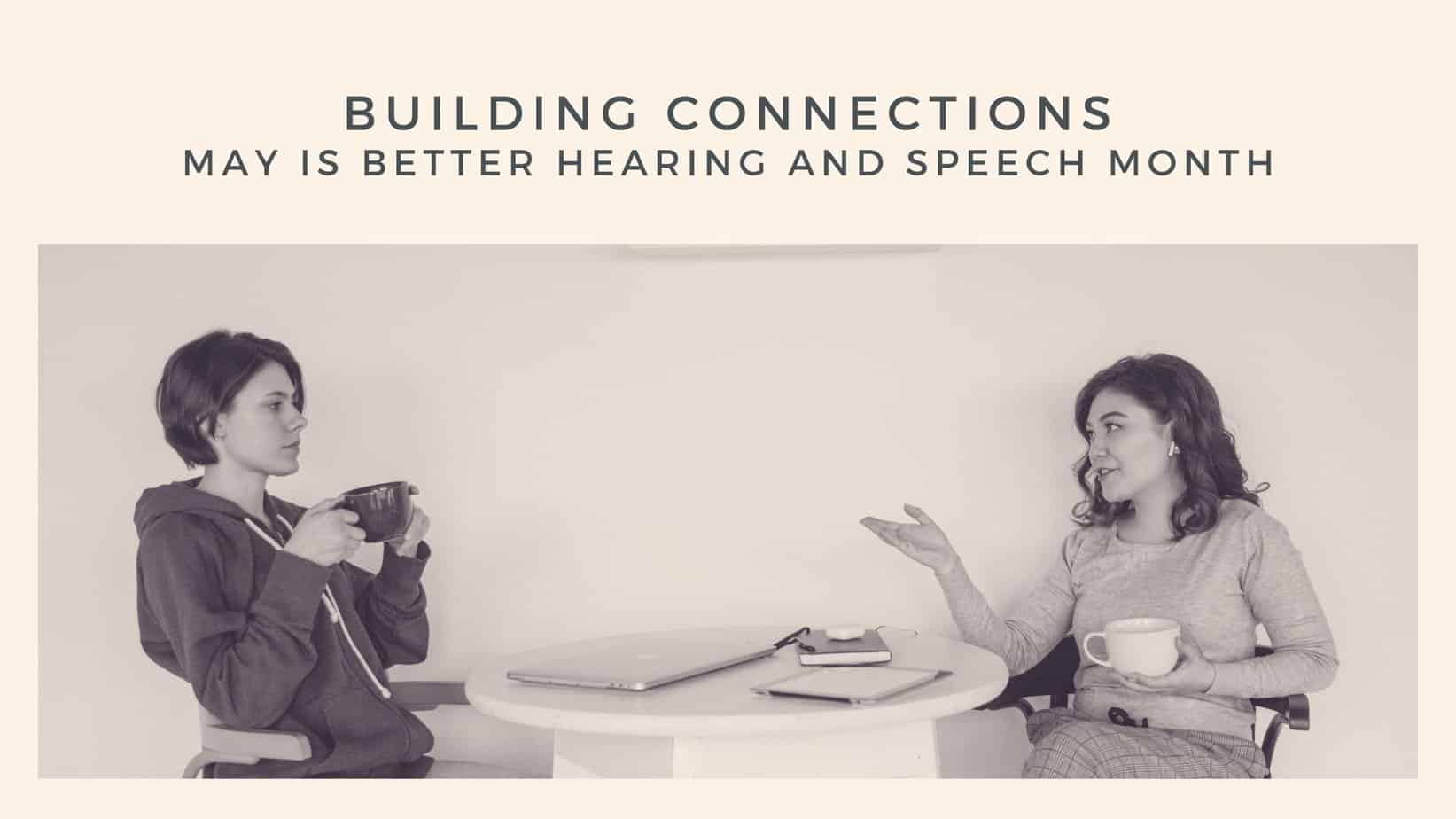Each May, ASHA (The American Speech-Language-Hearing Association) hosts Better Hearing and Speech Month (BHSM). The theme for 2021 is “Building Connections,” and we couldn’t imagine a better one for this year. As vaccination rates increase, life will be slowly returning to normal throughout the summer and fall. After over a year of social distancing and avoiding social gatherings, many of us are re-engaging with the world again in ways that have been impossible during the COVID-19 pandemic. It’s time to reimagine all the ways we can build connections in post-pandemic life.
Each week throughout BHSM, ASHA is focusing on a different topic of interest. You can keep up with them at http://asha.org/bhsm where they post blogs and other resources about BHSM. The weekly topics this year include:
- Week 1: Untreated Hearing Loss in Adults
- Week 2: Early Intervention & COVID-19
- Week 3: The Role of Health Care SLPs in COVID-19 Recovery
- Week 4: Summer Skill Building, Hearing Protection for School-Aged Children
The Importance of Regular Hearing Screenings
Hearing loss has posed a special challenge throughout the pandemic. Social distancing and face masks reduce our ability to hear speech clearly and to read lips. For those with mild hearing loss who may have been getting by without hearing aids, this was an especially difficult time to interact with others. It’s never been more important to get a hearing test and find out if hearing aids are right for you.
A hearing screening is a simple pass-fail check of your hearing ability. Those who receive a “pass” need do nothing more, while those who receive a “fail” should have their hearing tested more thoroughly. A fail does not automatically indicate that hearing aids are necessary, but further testing will give you a better picture of your hearing ability and time spent with a professional can reveal some ideas about how to protect your hearing going forward.
ASHA recommends getting a hearing screening at least once every 10 years until age 50, and once every three years after that. Those in high-risk professions or with a medical history indicating higher risk should have their hearing tested on a regular basis. Catching hearing loss early, especially noise-induced hearing loss, is the best way to prevent more serious hearing loss down the road.
Widespread Inaction on Hearing Loss in America
This week, ASHA released a new poll indicating a disconnect between the amount of importance we place on our hearing and the level of hearing healthcare engagement we see. While 80% of Americans consider their hearing health extremely important to their quality of life, only 20% of adults have had a hearing test in the last 5 years. Comparatively, 61% have had their vision checked over the same period of time.
Furthermore, 51% of adults polled reported having hearing problems, but only 11% had sought treatment for them. 78% of these same respondents said they have had their hearing issues for over a year, and 35% have had trouble for over five years. While 42% of those polled said they understood that mild hearing loss can have negative impacts on life and day-to-day functioning, 56% said they would not be likely to treat their hearing loss unless it was “severe.”
In recent decades, we’ve learned much about how untreated hearing loss can affect our lives, ranging from subtle issues – like earlier social fatigue – to bigger problems like brain atrophy, social isolation, earlier onset of cognitive decline and preventable hospitalizations. We’ve also learned how hearing aids can prevent these issues from coming to bear. 95% of hearing aid wearers report being satisfied with them when asked after one year, and the results are staggering between reported general life satisfaction of those who wear hearing aids and those with untreated hearing loss.
Hearing Wellness Solutions
Hearing aids today are sophisticated, sleek instruments that keep us connected in person, over the phone, and via Bluetooth. Computer technology has allowed their functionality to move into the background, so you can reap the benefits of specialized audio processing for different environments without having to lift a finger.
If you or a loved one is having hearing issues, make an appointment with us at Hearing Wellness Solutions today to get a hearing test. If a hearing loss is detected, we can help you determine if hearing aids are a good fit. Whatever your lifestyle consists of, there is a hearing aid option that’s right for you. Let us help you find the right one for you and so you can hear life and live well. We look forward to hearing from you!


